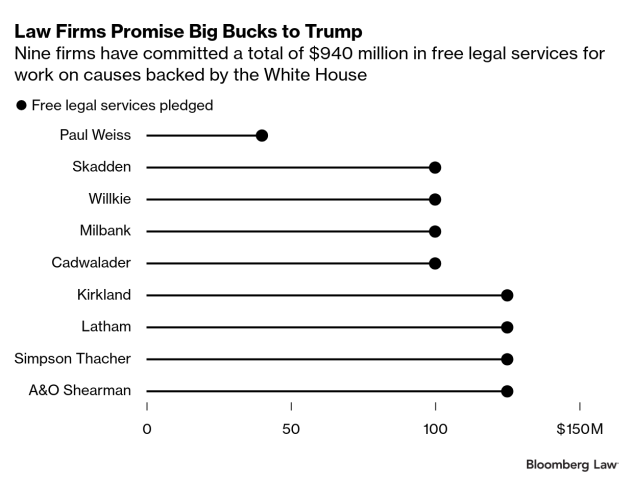- Written agreements show firms face first reporting deadline July 11
- No details on how White House deals will be managed
President Donald Trump’s deal with four law firms contains no specifics about how they’re going to make good on their $500 million pledge of free legal services, but a separate agreement with the US Equal Employment Opportunity Commission requires ongoing reporting about their compliance.
The firms struck deals in tandem with Trump and the EEOC to avoid punitive executive orders and resolve a federal probe of their diversity hiring programs. The agreements, and those with five other law firms, have been panned as a “shakedown” by Democrats and prompted questions about whether some of the world’s most powerful firms are now working directly for Trump.
Details of the deals, touted by the president in posts to his Truth Social platform, have remained largely shielded from the public. The firms committed generally to work on causes supported by Trump, including assisting military veterans, fighting antisemitism, and “ensuring fairness” in the justice system, “during the Trump administration and beyond,” the president said in an April 11 post.
But in a copy of the deal with the White House obtained by Bloomberg Law, the four law firms’ agreement mirrors Trump’s Truth Social post and doesn’t provide any further details on how the deals will be managed or what reporting requirements there might be with respect to the millions pledged.
In another agreement struck with the EEOC at the same time as their deal with the White House, the firms—Kirkland & Ellis, Latham & Watkins, Simpson Thacher & Bartlett, and A&O Shearman—are instructed to retain outside counsel to ensure compliance with “federal anti-discrimination laws” and with the terms of their agreement, according to a copy obtained by Bloomberg Law.
Outside counsel for the four firms, starting on July 11, 2025, shall submit “a confidential written certification” every six months through January 2029, “which shall be shared only with the White House,” the document said.
None of the four firms immediately responded to comment requests Friday, nor did the White House or EEOC.
Trump wants to use his panel of Big Law firms to defend police officers accused of misconduct, work on tariff issues, and help revive the coal industry, he said after the deal’s announcement. Several of the firms’ leaders said in internal communications that they would retain the right to choose the clients and matters they take on.
EEOC Backs Off
Andrea Lucas, the EEOC’s acting chair, in March sent letters to 20 large law firms seeking detailed information on their hiring and staffing programs, as well as their clients’ diversity, equity, and inclusion initiatives.
The EEOC “will not issue further similar requests for information” to the four firms that cut deals, according to the agreement. Still, the agency retains the right to “bring, process, investigate, litigate, or otherwise seek relief in any charge” that could “later arise against the law firms, in accordance with standard EEOC procedures.”
The $500 million collectively secured from the four firms brought Trump’s total pledged legal services haul to nearly $1 billion.
Trump began building his legal stable in February when he issued the first in a series of directives aimed at law firms over their ties to attorneys that previously investigated the president or went up against him in court. The moves instructed agencies to block firm employees’ access to federal buildings, revoke their security clearances, and scrap their clients’ government contracts. Trump also instructed the EEOC to review major law firms’ diversity practices for possible discrimination.
Paul, Weiss, Rifkind, Wharton & Garrison, the second firm hit with an executive order, was the first to strike a deal. Others opted to fight the president in court, winning rulings that have blocked large parts of the directives against them.
A federal judge in Washington ruled late Friday that an executive order issued by Trump targeting Perkins Coie was unconstitutional.
Other firms—such as Skadden, Arps, Slate, Meagher & Flom; Milbank; Willkie Farr & Gallagher; and Cadwalader, Wickersham & Taft—have joined Paul Weiss in the settlement spree, agreeing to provide free legal services, commit to merit-based hiring, and not engage in “illegal DEI discrimination.” Those deals came without executive orders targeting the firms.
The ambiguity surrounding the agreements has unnerved some corporate clients wary about conflicts and potential government influence over the firms. The New York Times reported this week that
Microsoft, however, hasn’t completely cut ties to Simpson Thacher, which worked with Skadden in advising the company on that $69 billion merger. Simpson Thacher continues to represent Microsoft in other matters, the technology giant told Bloomberg Law.
To contact the reporters on this story:
To contact the editors responsible for this story:



